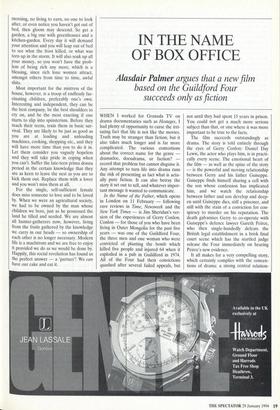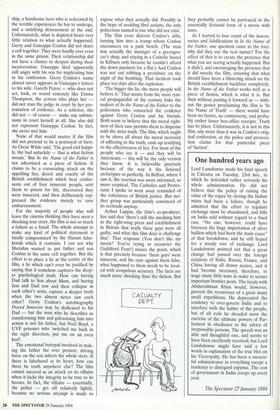IN THE NAME OF BOX OFFICE
Alasdair Palmer argues that a new film based on the Guildford Four succeeds only as fiction WHEN I worked for Granada TV on drama documentaries such as Hostages, I had plenty of opportunity to curse the irri- tating fact that life is not like the movies. Truth may be stranger than fiction, but it also takes much longer and is far more complicated. The various contortions about the correct name for the genre — dramadoc, docudrama, or faction? record that problem but cannot disguise it. Any attempt to turn life into drama runs the risk of presenting as fact what is actu- ally pure fiction. It can also betray the story it set out to tell, and whatever impor- tant message it wanted to communicate.
In the Name of the Father, which opens in London on 11 February — following rave reviews in Time, Newsweek and the New York Times — is Jim Sheridan's ver- sion of the experiences of Gerry Conlon. Conlon — for those of you who have been living in Outer Mongolia for the past five years — was one of the Guildford Four, the three men and one woman who were convicted of planting the bomb which killed five people and injured 64 when it exploded in a pub in Guildford in 1974. All of the Four had their convictions quashed after several failed appeals, but
not until they had spent 15 years in prison. You could not get a much more serious subject than that, or one where it was more important to be true to the facts.
The film succeeds outstandingly as drama. The story is told entirely through the eyes of Gerry Conlon: Daniel Day Lewis, the actor who plays him, is in practi- cally every scene. The emotional heart of the film — as well as the spine of the story — is the powerful and moving relationship between Gerry and his father Guiseppe. Guiseppe finds himself sharing a cell with the son whose confession has implicated him, and we watch the relationship between father and son develop and deep- en until Guiseppe dies, still a prisoner, and still with the stain of a conviction for con- spiracy to murder on his reputation. The death galvanises Gerry to co-operate with Guiseppe's defence lawyer Gareth Peirce, who then single-handedly defeats the British legal establishment in a brisk final court scene which has the startled judge release the Four immediately on hearing Peirce's new evidence.
It all makes for a very compelling story, which certainly complies with the conven- tions of drama: a strong central relation- ship, a handsome hero who is redeemed by the terrible experiences he has to undergo, and a satisfying denouement at the end.
Unfortunately, what is depicted bears very little relation to what actually happened.
Gerry and Guiseppe Conlon did not share a cell together. They were hardly ever even in the same prison. Their relationship did not have a chance to deepen during their incarceration. Giuseppe died apparently still angry with his son for implicating him in his confession. Gerry Conlon's name almost never appears in Guiseppe's letters to his wife. Gareth Peirce — who does not act, look, or sound remotely like Emma Thompson, the actress who plays her did not stun the judge in court by her pre- sentation of evidence. As a solicitor, she did not — of course — make any submis- sions in court herself at all. She also did not represent Guiseppe Conlon. In fact, she never met him.
None of that would matter if the 'film did not pretend to be .a portrayal of facts. As Oscar Wilde said, 'The good end happi- ly, the bad unluckily — that is what fiction means.' But In the Name of the Father is not advertised as a piece of fiction. It claims to be a coruscating attack on the appalling lies, deceit and cruelty of the British establishment which beat confes- sions out of four innocent people, sent them to prison for life, discovered they were innocent, and then deliberately sup- pressed the evidence merely to save embarrassment.
For the majority of people who will leave the cinema thinking they have seen a shocking true story, the film is not so much a failure as a fraud. The whole attempt to make any kind of political statement is fatally compromised by the blatant false- hoods which it contains. I can see why Sheridan wanted to put father and son Conlon in the same cell together. But the effect is to place a lie at the centre of the film, a lie which can't even be justified by saying that it somehow captures the deep- er psychological truth. How can having Dad talk to Son about Mum, and having Son and Dad row and then collapse in each other's arms, capture a deeper truth when the two almost never saw each other? Gerry Conlon's autobiography Proved Innocent may be dedicated to his Dad — but the man who he describes as transforming him and galvanising him into action is not his father, but Noel Boyd, a UVF prisoner who 'switched me back in the right direction, put me on an even keel'.
The emotional betrayal involved in mak- ing the father the ever present, driving force on the son infects the whole story. If there is falsehood at its heart, how can there be truth anywhere else? The film cannot succeed as an attack on its villains when it lacks the integrity to be true to its heroes. In fact, the villains — essentially, the police — get off relatively lightly, because no serious attempt is made to expose what they actually did. Possibly in the hope of avoiding libel actions, the only policeman named is one who did not exist.
The film even distorts Conlon's alibi, turning him into a tramp whom Conlon encounters on a park bench. (The man was actually the manager of a greengro- cer's shop, and staying in a Catholic hostel in Kilburn only because he couldn't afford the down payment for a flat.) And Conlon was not out robbing a prostitute on the night of the bombing. That incident took place ten days after the explosion.
`The bigger the lie, the more people will believe it.' That motto from the most cyni- cal propagandist of the century links the makers of In the Name of the Father to the policemen who concocted the evidence against Gerry Conlon and his friends. Both seem to believe that the moral right- ness of their case permits them to dispense with the strict truth. The film, which ought to be above all about the moral necessity of adhering to the truth, ends up testifying to the effectiveness of lies. For most of the people who see it — and they will be Americans — this will be the only version they know. It is believable precisely because of the way it fits fictional archetypes so perfectly. In Belfast, where I saw it, the reaction was more informed, so more sceptical. The Catholics and Protes- tants I spoke to went away reminded of the rottenness of British justice. But nei- ther group was particularly convinced of its rectitude anyway.
Arthur Lappin, the film's co-producer, has said that 'there's still the sneaking hint in the right-wing press and establishment in Britain that really these guys were all guilty, and what this film does is challenge that'. That response (You don't like my movie? You're trying to reconvict the Guildford Four!) misses the point, which is that precisely because 'these guys' were innocent, and the case against them false, what happened to them needs to be treat- ed with scrupulous accuracy. The facts are much more shocking than the fiction. But they probably cannot be portrayed in the essentially fictional form of a movie with stars.
As I started to lose count of the inaccu- racies and falsifications in In the Name of the Father, one question came to the fore: why did they use the real names? For the effect of that is to create the pretence that what you are seeing actually happened. But it didn't, and encouraging the pretence that it did wrecks the film, ensuring that what should have been a blistering attack on the British establishment backfires completely. In the Name of the Father works well as a piece of fiction, which is what it is. But then without putting it forward as — with- out the poster proclaiming the film is 'In the Name of Truth' — there would have been no furore, no controversy, and proba- bly rather fewer box-office receipts. Truth has its place. Unfortunately, it is not in this film, any more than it was in Conlon's orig- inal confession, or the police and prosecu- tion claims for that particular piece of 'faction'.



































































 Previous page
Previous page